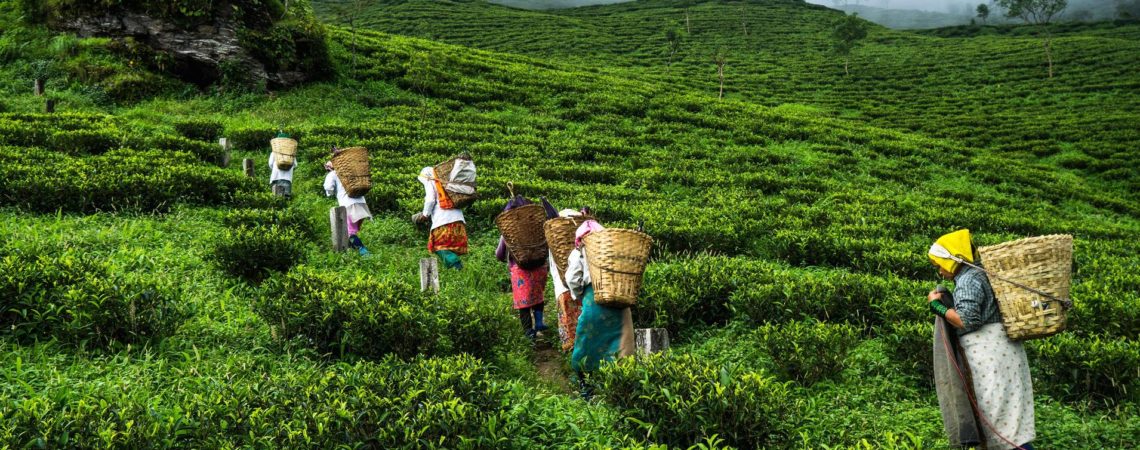The Second Wave of Covid 19 : Widening the Gaps of Inequality As Seen in The Tea-Gardens of Assam
June 8, 2021
by- Europa Doley*
Image Source – Google
Earlier this month, a picture of a woman hailing from a small town in Assam became viral on social media as the woman was seen carrying her father-in-law, a covid patient on her back to a District Hospital. She was praised all over the country for her bravery. Although, while it is indeed an inspiring story, what many people fail to see here is the troubling issue of the lack of basic health infrastructure in rural India that has made the fight against the second wave of Covid-19 pandemic even more difficult.
Image Source – Twitter
According to the statistical data released by The Centre for Science and Environment (CSE), half of the cases and deaths recorded in India, in the month of May are from the rural districts of the country. The pandemic was considered to be an “urban” problem until this year. While distressing messages of help on social media slowly started to decrease in the last few weeks, India is still far behind in this fight with the disastrous pandemic. Various reporters/journalists exposed the underreporting of the number of cases and deaths in rural india. Reports on the poor conditions of rural part of Bihar and UP are just two examples among other similar stories covered in the last month.The absence of a poor healthcare system in rural area is not new to a country like India but it provides a bigger picture of the crash in the system now since the hospitals in the urban part of the country also suffered greatly.
The month of May saw an alarming number of Covid-19 cases reported in the tea garden areas of Assam. The tea-garden workers residing in and around Brahmaputra valley and Barak valley, are multi-ethnic communities comprising multiple tribal and caste groups and are officially referred to as tea-tribes. They account for almost 17 percent of Assam’s population. Half of the country’s tea production comes from Assam and it also has huge demand in the international market. However, the tea tribes are economically backward, mostly illiterate and are largely living in poor health conditions without access to clean water and proper sanitation facilities. They live in very confined resident quarters with no facility to follow social distancing. They are not paid enough and are often treated very poorly in society.
As mentioned in Aljazeera’s report on tea-garden workers of Assam, according to the state’s Labour and Welfare Department, 7,121 COVID-19 cases spread across the state’s 403 out of 800 large tea gardens since April and the number of deaths stands at 53 (reported as of 1st June, 2021). The health facilities available in the tea plantations are not built to handle health crises of this extent.
The month of May is basically the plucking season of tea leaves and amidst the surge in Covid-19 cases, the tea-garden areas have shut down completely which has resulted in huge loss of production and business.
Image Source – The Indian Express
With many struggling to book vaccination slots in the country, even vaccines seem like a far dream for those who have no access to technology and vaccination centres. Leaders from the tea tribe community demanded a bigger vaccination drive allowing people to get vaccinated in and around tea-garden areas. Although the government started vaccination camps in the tea gardens without pre-registration after they faced criticism, it doesn’t make up for the reality that the tea tribe community is often neglected by the state.
Even though the WHO guidelines for fighting Covid-19 is clearly to follow proper sanitation and social distancing, the poor quality of drinking or running water in most of the tea plantations often forces residents to drink water from ponds. They even have no access to toilets, and thus following the said guidelines gets rather tough. Apart from proper sanitation facilities, the tea tribes or people in rural areas generally do not have enough N95 masks for better protection from the virus.
Even the ability to follow Covid 19 protocols depends on our privilege. For those who benefit from the unjust capitalist society, staying inside their home comfortably and following the proper guidelines is much easier than those who are underprivileged. There seems to be no end to the struggles faced by the tea workers or migrant labourers of the country.
It goes without saying that the virus needs to be contained but not at the cost of people suffering from acute poverty and hunger.
*Europa is an art enthusiast, an occasional reader, a musicophile and in her head, she’s living in the 60’s in a faraway land mostly chilling with Janis Joplin and Bob Dylan. Currently, doing her Master’s in Gender Studies from Ambedkar University Delhi and she is engrossed in the issues faced by the marginalised communities. Presently she is interning with kractivist.org

Leave a Reply